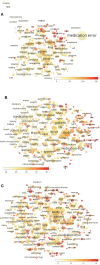First, Do No Harm (Gone Wrong): Total-Scale Analysis of Medical Errors Scientific Literature
- PMID: 33178657
- PMCID: PMC7596242
- DOI: 10.3389/fpubh.2020.558913
First, Do No Harm (Gone Wrong): Total-Scale Analysis of Medical Errors Scientific Literature
Abstract
Objective: Medical errors represent a leading cause of patient morbidity and mortality. The aim of this study was to quantitatively analyze the existing scientific literature on medical errors in order to gain new insights in this important medical research area. Study Design: Web of Science database was used to identify relevant publications, and bibliometric analysis was performed to quantitatively analyze the identified articles for prevailing research themes, contributing journals, institutions, countries, authors, and citation performance. Results: In total, 12,415 publications concerning medical errors were identified and quantitatively analyzed. The overall ratio of original research articles to reviews was 8.1:1, and temporal subset analysis revealed that the share of original research articles has been increasing over time. The United States contributed to nearly half (46.4%) of the total publications, and 8 of the top 10 most productive institutions were from the United States, with the remaining 2 located in Canada and the United Kingdom. Prevailing (frequently mentioned) and highly impactful (frequently cited) themes were errors related to drugs/medications, applications related to medicinal information technology, errors related to critical/intensive care units, to children, and mental conditions associated with medical errors (burnout, depression). Conclusions: The high prevalence of medical errors revealed from the existing literature indicates the high importance of future work invested in preventive approaches. Digital health technology applications are perceived to be of great promise to counteract medical errors, and further effort should be focused to study their optimal implementation in all medical areas, with special emphasis on critical areas such as intensive care and pediatric units.
Keywords: adverse drug events; bibliometric analysis; medical errors; patient safety; public health.
Copyright © 2020 Atanasov, Yeung, Klager, Eibensteiner, Schaden, Kletecka-Pulker and Willschke.
Figures




References
-
- Andel C, Davidow SL, Hollander M, Moreno DA. The economics of health care quality and medical errors. J Health Care Finance. (2012) 39:39–50. - PubMed
MeSH terms
LinkOut - more resources
Full Text Sources

